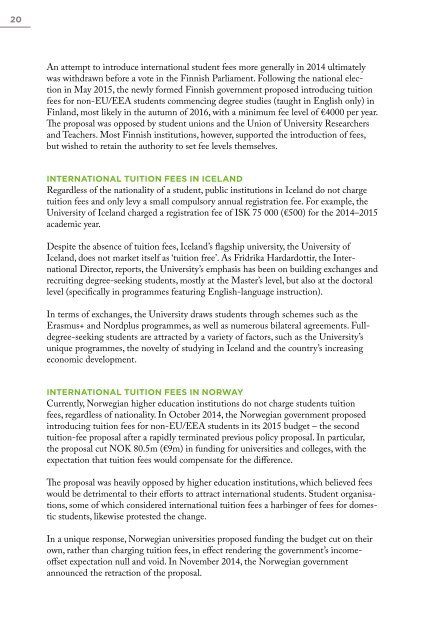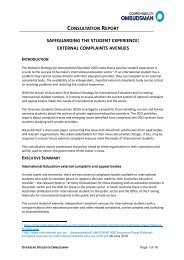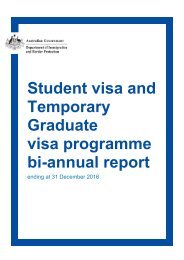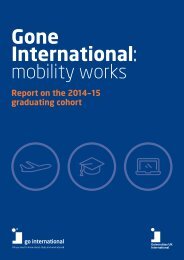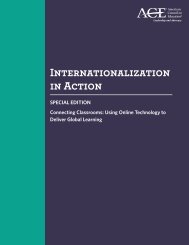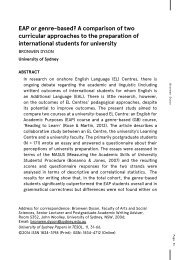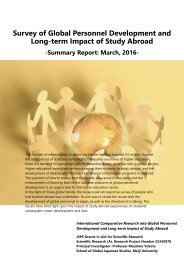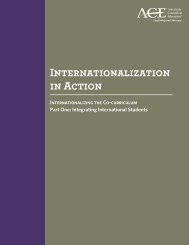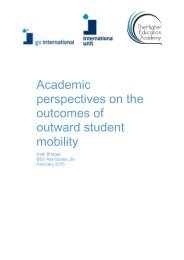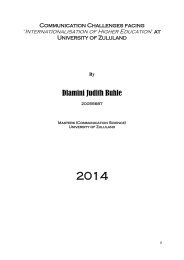A WEALTH OF NATIONS
(eaie)%20icg%20on%20nordig%20region%20fees%20-%20fall%202015
(eaie)%20icg%20on%20nordig%20region%20fees%20-%20fall%202015
You also want an ePaper? Increase the reach of your titles
YUMPU automatically turns print PDFs into web optimized ePapers that Google loves.
20<br />
An attempt to introduce international student fees more generally in 2014 ultimately<br />
was withdrawn before a vote in the Finnish Parliament. Following the national election<br />
in May 2015, the newly formed Finnish government proposed introducing tuition<br />
fees for non-EU/EEA students commencing degree studies (taught in English only) in<br />
Finland, most likely in the autumn of 2016, with a minimum fee level of €4000 per year.<br />
The proposal was opposed by student unions and the Union of University Researchers<br />
and Teachers. Most Finnish institutions, however, supported the introduction of fees,<br />
but wished to retain the authority to set fee levels themselves.<br />
INTERNATIONAL TUITION FEES IN ICELAND<br />
Regardless of the nationality of a student, public institutions in Iceland do not charge<br />
tuition fees and only levy a small compulsory annual registration fee. For example, the<br />
University of Iceland charged a registration fee of ISK 75 000 (€500) for the 2014–2015<br />
academic year.<br />
Despite the absence of tuition fees, Iceland’s flagship university, the University of<br />
Iceland, does not market itself as ‘tuition free’. As Fridrika Hardardottir, the International<br />
Director, reports, the University’s emphasis has been on building exchanges and<br />
recruiting degree-seeking students, mostly at the Master’s level, but also at the doctoral<br />
level (specifically in programmes featuring English-language instruction).<br />
In terms of exchanges, the University draws students through schemes such as the<br />
Erasmus+ and Nordplus programmes, as well as numerous bilateral agreements. Fulldegree-seeking<br />
students are attracted by a variety of factors, such as the University’s<br />
unique programmes, the novelty of studying in Iceland and the country’s increasing<br />
economic development.<br />
INTERNATIONAL TUITION FEES IN NORWAY<br />
Currently, Norwegian higher education institutions do not charge students tuition<br />
fees, regardless of nationality. In October 2014, the Norwegian government proposed<br />
introducing tuition fees for non-EU/EEA students in its 2015 budget – the second<br />
tuition-fee proposal after a rapidly terminated previous policy proposal. In particular,<br />
the proposal cut NOK 80.5m (€9m) in funding for universities and colleges, with the<br />
expectation that tuition fees would compensate for the difference.<br />
The proposal was heavily opposed by higher education institutions, which believed fees<br />
would be detrimental to their efforts to attract international students. Student organisations,<br />
some of which considered international tuition fees a harbinger of fees for domestic<br />
students, likewise protested the change.<br />
In a unique response, Norwegian universities proposed funding the budget cut on their<br />
own, rather than charging tuition fees, in effect rendering the government’s incomeoffset<br />
expectation null and void. In November 2014, the Norwegian government<br />
announced the retraction of the proposal.


